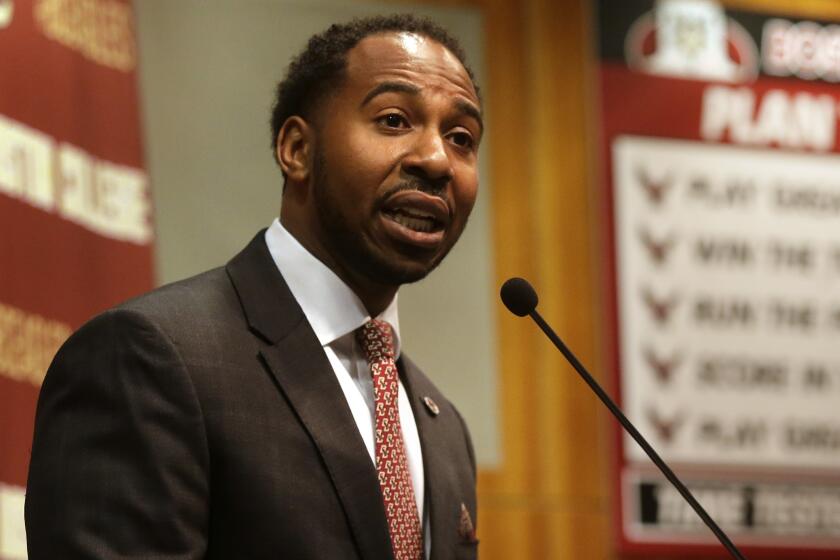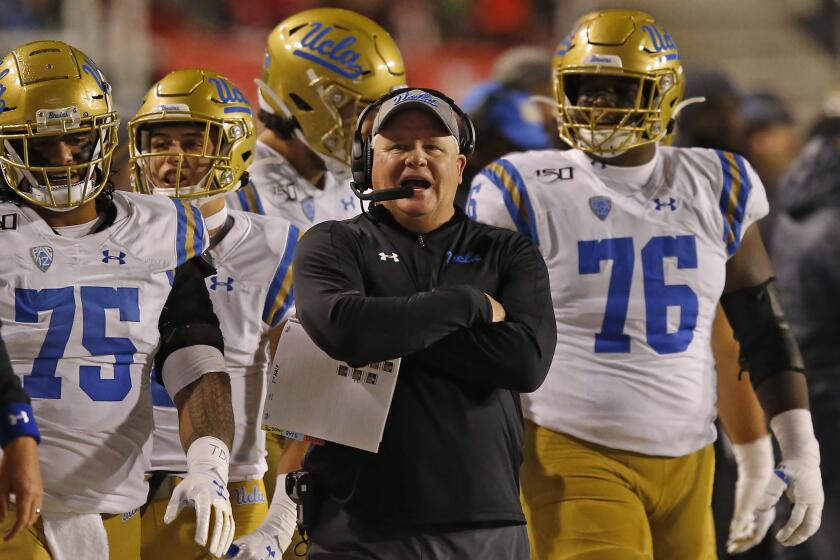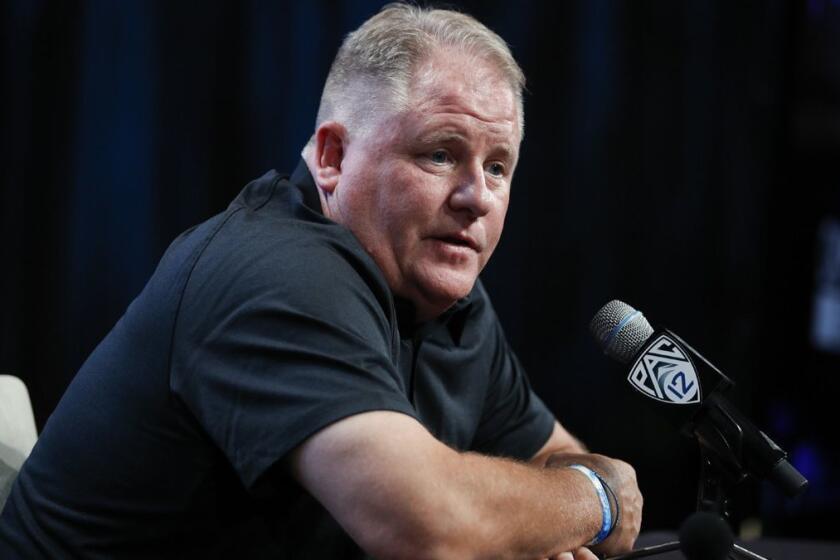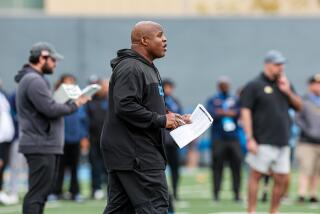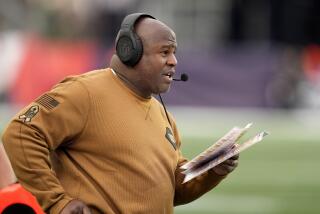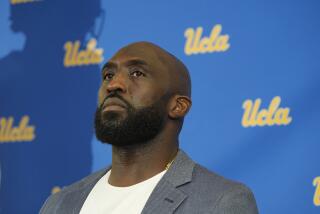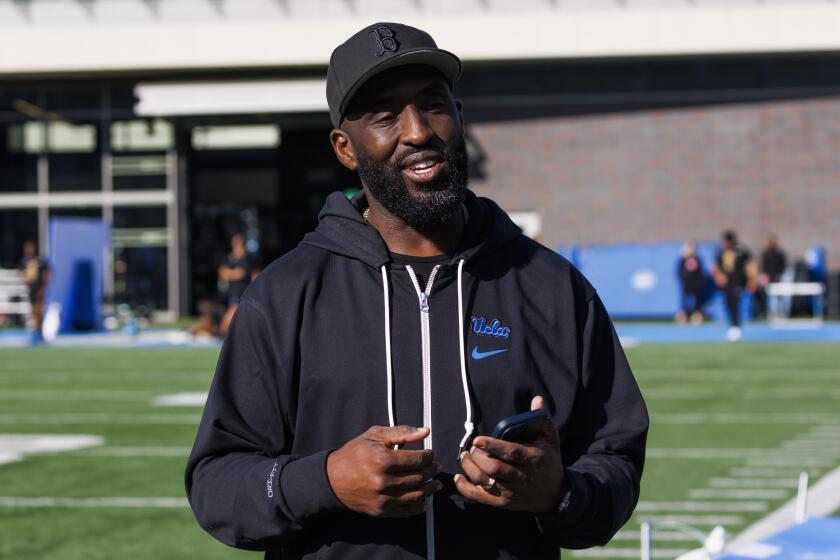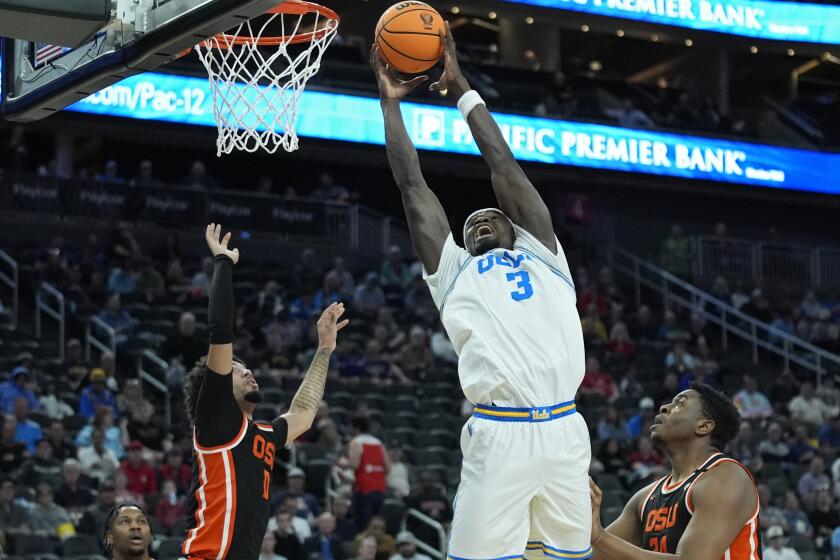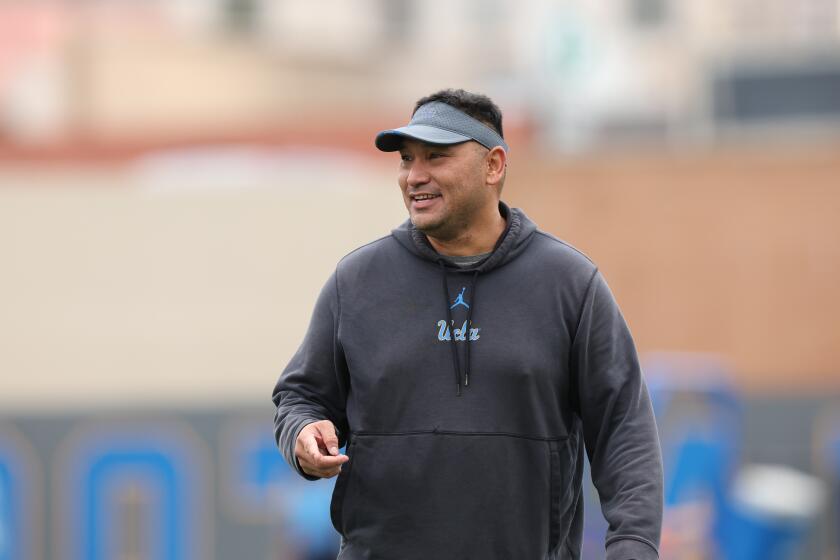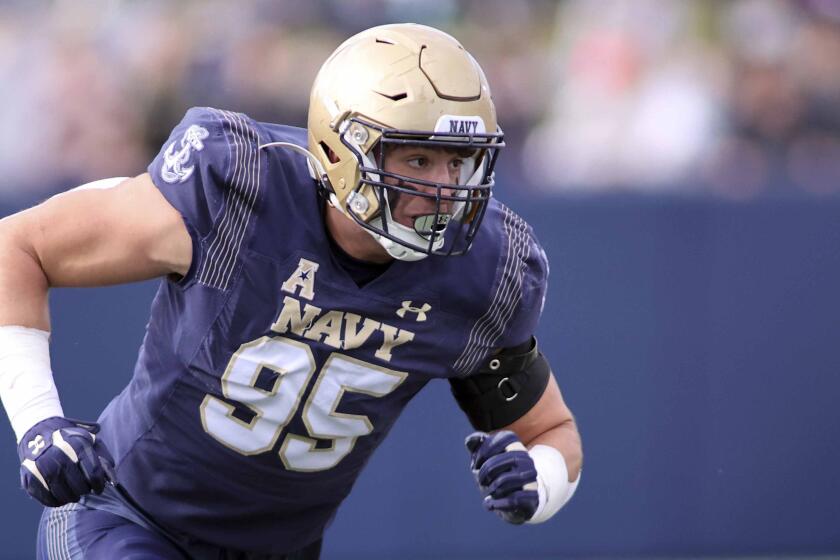Q&A: New AD Martin Jarmond discusses making an impact at UCLA
Martin Jarmond became not only the first African American athletic director in UCLA history last weekend but also the first to be hired without ever visiting campus. He was given a six-year contract last weekend after wowing university officials during online video chats forced by the COVID-19 pandemic that made in-person interviews impossible.
Jarmond, 40, spoke with The Times for about 45 minutes on Wednesday morning about a variety of topics as he prepares to formally start his new job that will pay him an average of $1.4 million over the next six years.
Where are you as we speak, one day after being officially hired?
I am in my office at Boston College. I’m going to be here through the end of next week officially in this capacity doing both, so right now I’m talking to you from my office here in Chestnut Hill, Mass.
When do you plan to start the job and physically be in Westwood full time?
You know, we’re still working on a start date. Ideally, in a perfect world, I’d start sometime to have some carryover with Dan [Guerrero, the athletic director who is retiring July 1], so whether it’s mid- or late June. But as far as moving, that’s the big unknown. I mean, there’s no handbook for moving during a pandemic and so we’re going through the process of just finding out what moving companies are operating in Massachusetts and if we can move and we’ve got to sell our house too, so I don’t know when I’ll move there, but it will be a while.
Have you physically been on UCLA’s campus?
No, I have not. I’ve heard it was beautiful but I have not been on campus.
Have you ever been to Los Angeles?
Yes, when I was at Michigan State and Ohio State, California was my fundraising territory, so I probably spent more time in Orange County than Los Angeles, but I’ve been in Los Angeles a few times.
Are the stereotypes about Los Angeles true?
The only stereotype I know to be true is the traffic is big in a negative way and you’ve got to operate when you leave based on [the traffic] on the 10 and the 405. I do know that. That stereotype is true.
How did the logistics of the interviewing process work? Was it all telephone calls and Zoom meetings, and what was that like to go through?
Yes, it was all virtual, at least my process. I don’t know everybody else’s and just so you know, on the search questions, I usually would defer to UCLA and Chancellor [Gene] Block because it was their search, I was just a participant. But I would tell you it was all virtual for me. I haven’t met them in person. It was odd. I mean, doing an interview over Zoom, I’ve never done that and not many people can say they’ve interviewed over Zoom, so it’s a little odd because you don’t have that personal connection. You have to worry about things like, should I be looking at the camera or the screen, so it’s little quirks about doing it via Zoom. It’s still connecting in a way, it’s just not as probably personal as being face to face.
What was your buyout at Boston College and did that cause any issue in negotiations with UCLA?
You know, that’s a question that I’d probably leave for Chancellor Block and UCLA to answer. Like I said, I was just a participant, so I think it’s best for them to address that.
UCLA’s new athletic director Martin Jarmond will be besieged by a slew of challenges that go well beyond the uncertain resumption of play amid the novel coronavirus outbreak.
What made the UCLA athletic director’s job more attractive than the post you held at Boston College?
The opportunity to have a major impact. UCLA, from an athletic and academic standpoint, is elite, and there’s not many elite institutions that do it at a high level in the country. And so when you have the opportunity to be a part of a place that is so historic and produces so many leader and legends — Jackie Robinson, Arthur Ashe, Kareem Abdul-Jabbar — it’s amazing to be a part of — John Wooden. So any time you have a chance to be a part of being a caretaker or a steward to a program that’s elite, it’s probably a once-in-a-lifetime opportunity. Those just don’t come available.
And so for me, it was really, I want to have an impact on our student-athletes and I want to have a platform and ability to have an impact and be a leader in college athletics and that’s what UCLA is. You know, there’s a lot of things going on in our business now, there are a lot of challenges, but I can tell you, UCLA will be at the forefront of those solutions and leadership as we move forward, and so it was just the opportunity to impact student-athletes and be a part of an elite athletic, high-level academic institutions.
What does it mean to you to be the first African American athletic director at UCLA, a school known for racial pioneers?
I understand the significance of it to a lot of people, but for me, quite frankly, I’d love the day to come where I’m not [primarily known as] the first African American athletic director at Boston College, I’m not the first African American athletic director at UCLA — those are the days that I long for.
I certainly understand the importance and the perspective, but for me, I’d rather focus on the opportunity afforded to me because of what we’ve been able to accomplish and what we’ve done and the places that I’ve been, so I understand the importance, I’m humbled by it, quite frankly, I think it is important, especially for student-athletes — or students, really — to be able to see people that look like you or have something in common, to believe that you can achieve and accomplish certain things. So from that perspective, it is very important because I know when I was coming up in this business it mattered to me when I saw people being athletic directors who looked like me — it gave me more confidence — so I understand and appreciate the historical perspective, but I’d love to get to the point where I’m not the first anymore.
What are your top priorities in making UCLA’s athletic department the best it can be?
My first priority is just to listen and learn from the coaches and staff and donors and people that have been on the ground that have lived and breathed UCLA athletics for quite some time. In my opinion, you can’t come into a situation saying what you’re going to do unless you really understand the landscape and you understand the culture and the nuance and where we are and, obviously, I haven’t been there, I haven’t even started yet, so I don’t know that. So my first priority is really to listen and learn from the staff and the coaches, get in there and then take all of that and at some point devise a strategic plan of moving forward and how we’re going to move the program forward and that’s something that’s going to be a strategic process, it’s going to take time, but again, I don’t think you can act before you learn and you listen, and so that’s really my No. 1 priority.
A UCLA basketball team three points away from a postseason ban last year improved its APR by 12; the football team boosted its single-year APR by 61 points.
What were the main lessons you learned at Boston College that you think will help you at UCLA?
That’s a great question. What I would share is, even though they’re different on the surface — one’s a private, Jesuit Catholic institution and one is a large public [school] and both are academic high-level — even though they’re different from that standpoint as far as those things and one is in the northeast and one is in L.A., there are some similarities and one is just the pressures in college athletics on the budget and the arms race and having financial, fiscal responsibilities to really look at how we can best steward our resources but also how we have to fund-raise and really rely on private support. At Boston College, you have to do that a lot and I imagine it’s the same way at UCLA. That’s something that I think is consistent across the board in college athletics — the need for private support and also, especially in this environment, the need to look at costs and what we’re doing and how we’re doing business and be nimble. You know, you have to be flexible.
The other thing too is at BC, I had to push. We needed energy, we needed a jolt, we needed juice and we needed a direction as far as where we wanted to go, so that was part of working hard for that year and a half on the strategic plan, to have a direction, my engagement with our fans and our community because we needed energy and we needed a sense of who we are and where we’re going and that might be helpful as far as my experience there and once I get to UCLA to learn more about the culture and where we are and how we need to move forward so we can maintain and push the envelope on being elite and what does that look like? How do we engage? How do we operate? Where are we going? I think that’s going to be important, some of those experiences.
Dan Guerrero was not active on social media or known for engaging with the casual fan, but you have a reputation as being energetic on both of those fronts. What can that type of engagement do to help an athletic department?
You know, I think it brings energy. You have to look at the people we serve, and we serve a lot of different constituencies, but the most important constituency group we serve is our student-athletes, and how do our student-athletes communicate? A lot of it’s social [media]. So to me, it’s a way to engage and interact but also relate to our students because again, that’s who we serve but also I think energy and enthusiasm starts with students on campuses, so when you talk about what we’re trying to do — whether it’s fan support, whether it’s different student initiatives — you have to have that level of engagement to be successful, but for me, it’s an outreach of really trying to engage and relate and communicate and meet students where they are, and that’s the way that they communicate quite a bit, as you know. So I think what that does for an athletic department is, it brings a level of energy, it brings a level of understanding and empathy, meeting students and people where they are — and fans the same way. So I believe in having a social media presence. That doesn’t make it right or wrong. You know, you have to do what you’re comfortable with and I’m comfortable in that space because I think it’s valuable to communicate.
UCLA’s athletic department was $18.9 million in the red for the 2019 fiscal year and there’s been speculation that that figure could double in 2020. Do you have any idea what sort of deficit the department is facing for the 2020 fiscal year, and what are your plans to help it get back in the black?
You know, I don’t know the exact details. We’ve had conversations, but I choose to keep those conversations at this point between me and the chancellor and the committee members. But what I can say is that Chancellor Block, in my conversations with him, is very supportive of athletics, he understands the importance of being successful and winning and how that is a bright spot for the institution and that was very reassuring for me during the process hearing from him.
The university issued an interest-bearing loan to cover the department’s 2019 debt. Did Chancellor Block give you any assurances about the university doing more to help the athletic department going forward?
At this point, I’d rather keep those conversations between the chancellor and I, but again, he made me feel that he understands the importance of athletics and working together with campus as we meet those challenges. And I’ll tell you about budget challenges, it’s really no different than a lot of other athletic programs — and this is even pre-COVID. Now, you know with post-COVID, you’re going to have more challenges and financial uncertainty and that’s something that we’ve just got to face, but that’s a challenge that I’m willing to accept and it’s no different than a lot of places that are facing those financial pressures with this environment now, especially with so many unknowns that are coming in the fall.
Did you and the chancellor discuss contingencies for the athletic department’s budget in the event that football games are not played next season or there’s no ticket revenue from fans not being allowed to attend games?
No. I haven’t engaged in that conversation at all … with UCLA or the Pac-12. I’ve been engaged with the ACC and what the ACC is doing, but no, I haven’t had any meaningful conversations at all about what the fall looks like from a UCLA or Pac-12 perspective.
Football success is the lifeblood of any major college athletic department and UCLA is coming off four consecutive losing seasons for the first time since the 1920s. Attendance at the Rose Bowl last season was at a record low. What can you do as an athletic director to rectify that situation?
Obviously, football is very important. We need football to be successful; I’m committed to winning in football and basketball. We need them to be successful but also there’s an economic reality to them being successful that is very important to the broad-based excellence that we believe in and that we strive for, so I understand that. I’m looking forward to learning and getting in and understanding from Chip [Kelly] how I can help him and the program be successful and again, that’s something that I’ve got to sit down with him and learn the program and what’s going on now and what does he need from me.
Coach Chip Kelly said he is planning as if UCLA will play football this season because no one has definitely said what will happen in light of the COVID-19 pandemic.
The one thing I can tell you is, I’m going to lock arms with him and try to make sure that I’m doing everything I can to help football be successful; you have to do that — that’s nonnegotiable. Football is too important and the success and what we’re trying to do and we want to win, you’ve got to be alive and you’ve got to be locked in from an athletic director’s standpoint to say, “Hey, what do you need and how best can we get there to help us be successful?” So that’s something I’m committed to, and my first phone call with Chip over the weekend when I called him after [the hiring] was done and I said, “Hey, I’m looking forward to working with you and learning what I can do to be helpful so we can keep moving this thing forward.”
So was that one of the first calls you made?
Yeah, he was one of the first calls I made, absolutely.
How did that conversation go? Was he receptive?
Oh, yeah, it was great. It was a great conversation, he was excited for me and I’m looking forward to working with him and getting to know him and just understanding the ins and outs of his program and how we can move forward, so it was a great conversation and I’ve heard great things about him from people in the industry. Obviously, the guy that I hired at Boston College as head coach, Jeff Hafley, was on Chip’s staff at San Francisco, so he shared some thoughts about Chip and I’m just looking forward to getting there and working with him.
How will you go about evaluating coach Kelly after he lost more than twice as many games as he won in his first two seasons, especially given that you’ve said programs either sell hope or winning and it seems right now as if Kelly can’t sell either one?
You know, I have to get there and understand where we are as a program, and so I can’t really understand that until I have a better understanding of the landscape of what we have and that entails a lot — that’s all aspects of the program. So I’ve got to get there and learn from him what I can do to help him be successful and evaluate. You know, obviously, we want to win — winning is important and I’m committed to winning — and so just like Chip would tell you, we want to win more games than we lose, obviously. But for me to tell you how I’m going to do and evaluate, that’s premature right now. I have to understand where we are and how we stack up and just learn more about the program in general.
UCLA donors have been very generous in their giving over the last decade, contributing roughly a half billion dollars toward a variety of projects. How will you go about countering potential donor fatigue, especially given the lack of success in football?
I’m excited just to meet all of our donors and our fans and just engage in a meaningful way. You know, it’s about relationships and I’m anxious to get started with forming those relationships and learning from them about getting their perspective and how they feel about UCLA athletics and how they feel they can support and help us move forward. As far as donor fatigue, the good thing about coming in new is I’m not privy to any of that.
What I do know is, we need donor support to be successful. What I do know is no matter what has happened in the past, we need everybody to help us move forward and get to the place that we want to be and we want to maintain being elite. That’s the goal and we are elite and we’ve got to keep pushing that to maintain and push forward, especially from a broad-based standpoint. So we need everybody and whether there’s fatigue or not, I have no idea. What I do know is, we’re not going to be able to do this without the help and support of our fans and donors and I’m excited to get started.
UCLA is locked in to long-term apparel and marketing contracts, and the Pac-12’s television deal isn’t up for renewal until 2024. Do you have any ideas for new revenue streams the school can tap to help provide additional resources?
You know, I have ideas of things that I’ve either been a part of or implemented, but again, until I get there and understand what we’re doing already, I don’t know. I mean, I can give you 10 thoughts that I’ve already had, but if we’re doing seven of them, you’ve got to think differently. But I have to learn the landscape — what are we doing, what are the opportunities, how do our fans view this? You don’t really form those things until you really get your feet on the ground and get a better understanding of what are we currently doing and what are the opportunities — and that’s a lot of listening and learning from everybody that’s there.
You’ve talked about the link between equity in resources and equity in performance. Do you see the revenue gap between the Pac-12 and other conferences like the Southeastern and Big Ten factoring into the Pac-12’s relative lack of appearances in the College Football Playoff, and if so what can be done about it?
I’d have to look at that more as far as if that’s a direct result of that, but I would tell you, resources matter, let’s be frank. Resources matter, and you want to have as much of a level playing field with your peers that you can have and so again, I don’t know exactly the Pac-12 landscape and all the revenues and different opportunities. I am aware of the 2024 [TV deal]. As far as what the impact of that does, I don’t know, but what I do know is, resources do matter and you want to be as close as possible to your peers.
There’s been some speculation that the Ohio State athletic director’s job might entice you once Gene Smith retires, given your ties to that university and its status as the gold standard of athletic departments. Is there any merit to that idea?
[Laughs] I haven’t even started at UCLA and you’re asking me about another job. I’m just excited to get to Westwood and get some better weather than what I’m used to now and locking arms with everybody to see how we can move our program forward. That’s what my focus is and I appreciate the question, but I haven’t even started and we’re talking about other places.
Your alma mater, North Carolina Wilmington, upset fourth-seeded USC in the first round of the 2002 NCAA tournament a year after you graduated, so you already know what it’s like to root against the Trojans, right?
Absolutely. That was one of my proudest moments. I was like a proud papa. I was in grad school watching that game with my jersey on and when they did it, I collapsed on the floor and just started bawling. I was so happy. Oh, man, I’m getting goosebumps now as I’m walking here. That was a great moment, and I hope to have many more moments where we’re beating USC.
What has lockdown life been for you and what shows have you been binge-watch?
It’s been interesting, to say the least. I think just like everybody, you’re kind of hitting a point where you’re ready, you’re chomping at the bit to kind of get out and do more, and my family, we’re certainly no different. It’s been interesting. I travel a lot in this job obviously as an athletic director, so being home more has been nice, spending more time at home. I think this is going to help some of us that really travel a lot look at efficiency and being home and can we do more Zoom and can we do different things, so I think that’s been interesting. And the shows that I’ve watched, I just started “Ozark,” so I’m about seven episodes into Ozark, and obviously “The Last Dance,” but I have to admit I haven’t seen the last four episodes. Life kind of picked up in the last 12 days.
More to Read
Go beyond the scoreboard
Get the latest on L.A.'s teams in the daily Sports Report newsletter.
You may occasionally receive promotional content from the Los Angeles Times.

